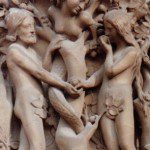 At times the psalmist of 119 expresses his pain. In v. 25 he asserts that his soul clings to the dust. In vs. 28 he claims that he is “racked with grief.” Of course, we don’t know why he says these things. Is this a prayer after falling into sin? Is he opposed? What has happened to him? Is “he” a “him” or not? (Probably so.) I envision the psalmist prostrate on the ground. Somehow this person has been humiliated. What’s the hope?
At times the psalmist of 119 expresses his pain. In v. 25 he asserts that his soul clings to the dust. In vs. 28 he claims that he is “racked with grief.” Of course, we don’t know why he says these things. Is this a prayer after falling into sin? Is he opposed? What has happened to him? Is “he” a “him” or not? (Probably so.) I envision the psalmist prostrate on the ground. Somehow this person has been humiliated. What’s the hope?
That God would “quicken” him (piel of chayah).
That God would “sustain” him (piel of qum).
Importantly, his resolution is that he can be restored to life and sustenance by the “word” of God. If he is thinking of “scripture,” he is contemplating spending time listening to God as he reads and meditates; he could be thinking of “word” as memorized utterances he has learned, but it is probably the first. The Word, the written Word, as God’s communication with us, as God showing the divine face and gazing at us so we can turn to face God back, is a restoring, healing, life-bringing communication. Why? Because words convey God’s grace to us; they convey God’s rebuke; they convey God’s restoration.
Psalm 119:25-32, the “D” sentences of this Hebrew acrostic psalm, contain commitments. The psalmist announces to God in prayer the equivalent of our “I Have Decided.” Notice the following commitments:
v. 26: “I have declared my way.”
v. 30: “I have chosen the way of faithfulness.”
v. 30: “I have set your rules before me.”
v. 31: “I cling to your decrees…”
v. 32: “I eagerly pursure your commandments.”
The spirituality of Psalm 119 is a spirituality of commitment to the Word as a spirituality of commitment to the God who speaks to the psalmist in that Word. The pain of the psalmist (v. 25) leads the psalmist to renew commitment to know God through the Word.
I find Psalm 119:32 fascinating. TNIV: “I run in the path of your commands, for you have set my heart free.” JPS: “I eagerly pursue your commandments, for you broaden my understanding.” Hirsch: “I shall walk once again with vigor in the path of thy commandments, if thou wilt ease my heart.” I see this as the desired answer to the psalmist’s prayer — even if expressed as a hope of what God will do when God quickens the psalmist out of pain and humiliation. The psalmist wants to be able not just to “walk” but to “run” on the path of God’s commandments (the mitsvot). Freedom, that broad heart of joy and confidence and exhilaration at doing God’s will, is what the psalmist finds. The same idea is found in v. 45: “I will walk about at ease.” Knowing God’s will and doing God’s will liberates the soul — so says the psalmist. It gives that person a heart that is at ease.












